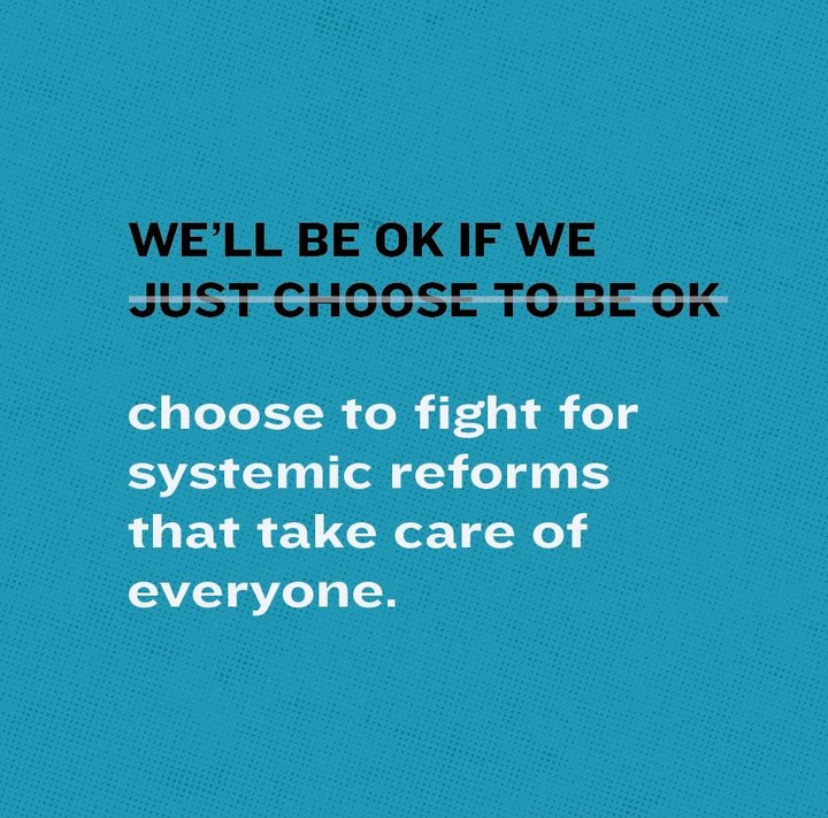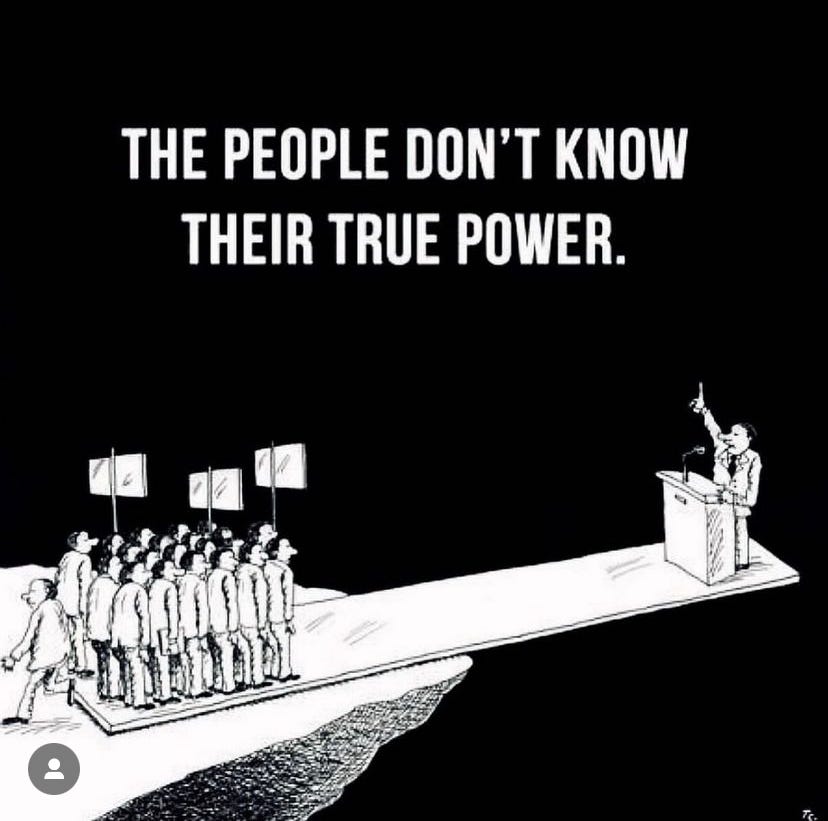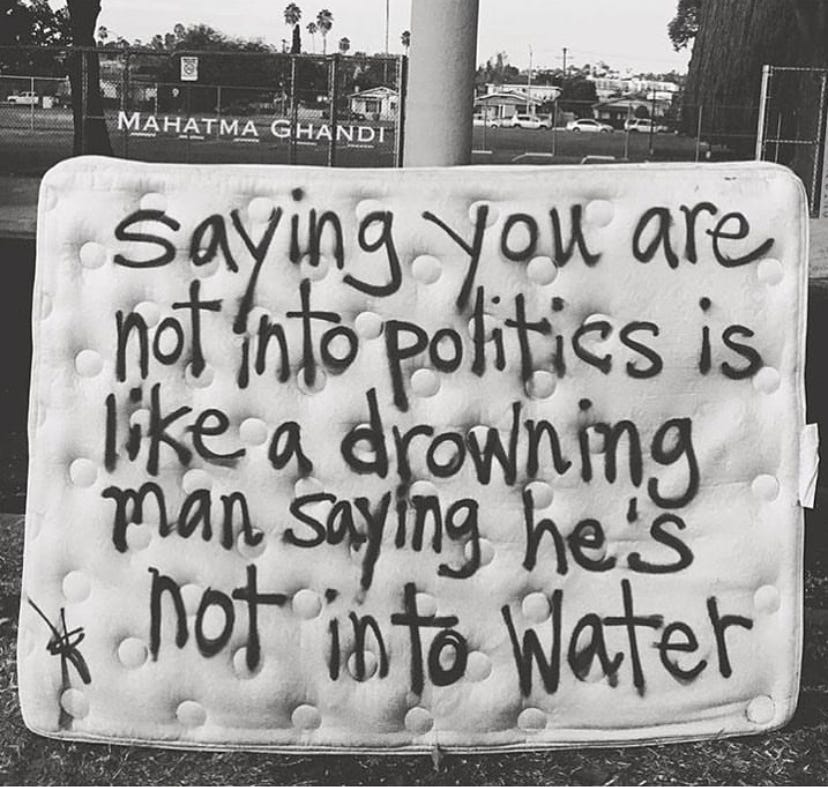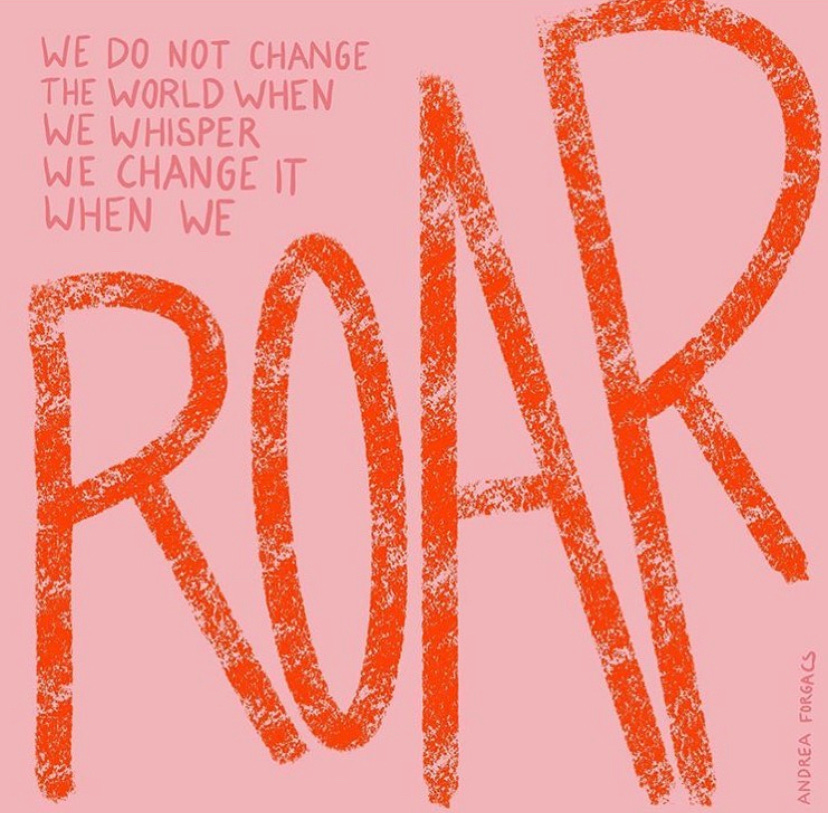|
CTZNWELL is community powered and crowd-sourced. That’s how we keep it real. Please consider joining us on Patreon for as little as $2/month so that we can keep doing the work of creating content that matters for CTZNs who care.
This is not a moment for magical thinking. Democracy hangs in the balance in these midterms.
The state legislature, governor, Secretary of State, and courts are lining up to implement more voter restrictions, target trans people, prevent learning and prosecute abortions.
Look, it’s ok to be frustrated with American politics. Politics has been “trumped” by fanatical politicians and corrupt policies. These days, we leave politics to the pundits, we entrust our wellbeing to unaccountable politicians and we stand by while private sector technocrats like Jeff Bezos and Bill Gates meddle in policy. Not only has politics fallen out of alignment with our values and principles, it has fallen out with the people.
But not voting is not like boycotting. you can’t boycott government the way you might boycott a company. When you opt out of the voting process it is WE who suffer not the government. Furthermore, the right is counting on you NOT voting. That’s the only way they win.
We are only powerless when we give away our power. Elections are not the only way, but they are a critical way that we play our part, take our power back and bend the arc towards justice and equity.
Rally your people to the polls. Demand more from your politicians. Be relentless in building the better future that we all deserve. Do you part.
Kerri (she/her)
Art by @ryanlemere
The extremism of the right forms a social scaffolding that allows for the kind of endemic political violence that can undo a democracy.America Can Have Democracy or Political Violence. Not Both. [click to tweet]
The real target of Just Stop Oil’s tomato soup action wasn’t Van Gogh’s painting. It was our complacency. The Van Gogh Is Fine; You Won’t Be. [click to tweet]
The holidays are around the corner. A time for families to come together and, more and more, to come apart. The Art of Persuasion in a Polarized Age. [click to tweet]
Voting is important, but it's not enough — we also must make politicians and media address the effects of actions that roll back our rights. It’s time to queer the vote. [click to tweet]
How to dream your way toward a radically decolonized future. An excerpt from Rest Is Resistance by Tricia Hersey. [click to tweet]
The best thing we can do over these last few days is get our people to the polls. And inevitably you will likely come across someone who is too busy, too distracted, to disheartened to vote. Here are some myth-busting tips to help you navigate voter resistance:
1. “My vote is just one vote, so it’s not significant enough to matter.”
This is an excuse that almost all of us have heard. It's understandable that people might feel this way, but it couldn't be further from the truth. There have been many times in history that a single vote was the deciding factor in a major election. In 2016, a House Representative from Wyoming won by just one vote, 583 to 582. In 2008, Republican Rep. Mike Kelly won re-election by a vote of 5,018 to 5,017 over Democratic challenger Karl Kassel. Four years later, Representative Stacey Newman of Missouri won 1,823 to 1,822--just one vote more than her opponent. Now how can you tell us that just one vote can't change the course of the future?
2. “There are no good options, none of them stand for what I truly believe in.”
No candidate is perfect, and that fact shouldn’t discourage us from voting for the one who most closely aligns with our beliefs. It’s better to have someone in office who agrees with two or three of the core issues we are working to reform, rather than someone who will actively support mass incarceration. Choosing someone who checks off some of our boxes is still a step in the right direction.
3. “The government system is corrupt. It’s broken beyond repair at this point.”
The criminal (in)justice system we are living under isn't broken, it works perfectly. It does exactly what it was made to do. But the way it’s made is not for our people. What makes our system work this way one might ask? People. People are the ones who create and maintain the system. A way to change the system is to change the people who influence the system, and that’s where voting comes in. We need to vote for the people who make sure the system is in our best interest, and not vote for the people who perpetuate corruption.
4. “The Electoral College system is rigged. Hilary got more votes than Trump, but he won.”
The Electoral College only applies to presidential elections, which are every 4 years. There are so many other important elections between then, however, that affect our daily lives and do not use the Electoral College. Local and state elections are based on a simple popular vote win and influence issues closer to home, such as housing, employment, reproductive rights, and criminal (in)justice reform. Our votes have even more power locally than they do at the federal level because, on average, far less people vote locally than they do nationally. Because the Governor, Lieutenant Governor, Attorney General, Secretary of State, Treasurer, House Representatives, and many State Senators have their seats open in this election, we have a chance to “reset” the state.
6. “I have so much on my plate right now, so voting is not a priority.”
When we are just trying to make ends meet day by day--which is even harder for people with convictions--it’s easy to push voting to the side. Voting can seem very disconnected from the challenges we face everyday, but it can actually release those stresses. The minimum wage we receive, the healthcare we have or don’t have, and whether or not we’re able to access housing with the stamp of incarceration on our backs are all a function of the government. By voting, we are making our voices heard and let the government know how it should be taking care of us.
7. “The polls are not easily accessible for me.”
Voting takes less than 15 minutes on average, whereas the issues and people we are voting on will affect us for the rest of our lives. While many states require employers to give employees paid time off to go vote, unfortunately Louisiana isn’t one of them. But if we all go vote, we can change this and add our state to that list! In the meantime, you can pack a lunch for work and head to the polls during your break or early before your day starts. Most polls are open as early as 7am and as late as 8pm. Find your polling location hours here. Early voting is strongly encouraged (check here for state rules). If transportation to the polls is an issue, there are options such as getting a free ride through RideShare2Vote.
“Organizing is how we take care of each other. And it starts where we are. What begins at the local level expands so that our efforts and resources aggregate for love and justice. We move on behalf of the whole (not the few) in collective action with social and political movements that advance our values and democratize wellbeing for all. This requires both organizing depth (in how we build trust/relationships and create culture) and scale (in how we engage the disengaged and bridge across movements). It is a holistic approach to organizing through personal practice, community building, and collective action as we transform ourselves and restructure our world to support the conditions of wellbeing for all.
We the people are the heart of this ecology and what we believe about ourselves and one another matters. Together, we must reclaim our power as citizens and build a capacity to be active creators and stewards of our communities. For centuries, institutions have told people (especially marginalized people) that they don't have power, that they must settle for the status quo and accept the reality we are living in. But Kazu Haga reminds us that we have to “cut through the delusion that we are powerless” and realize that together we have the power to change our conditions. Organizing is just that: it creates the conditions where more people have the power to resist and create systems that take care of everyone. It is the unofficial fourth branch of our government, “we the people” that exercise our collective political power to influence a politics of wellbeing that takes care of everyone”. (Excerpt. from American Detox: The Myth of Wellness and How We Can Truly Heal)
We can change the world when we choose to change the world.
Art by @andreaforgacs







